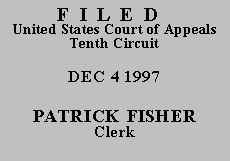

| ROBERT LARA,
v.
LAWRENCE RAEL, Chief
Administrative Officer, in his official
capacity; CITY PERSONNEL
BOARD |
No. 96-2217
(D.C. No. CIV-95-366-BB) |
The substance of Mr. Lara's claims against Albuquerque is not before us; we therefore cite only those facts relevant to our disposition of the present procedural matter. After he was fired by the city, Mr. Lara challenged his termination before a municipal administrative body, which ruled against his claim. Mr. Lara also filed a state court action alleging, among other things, breach of contract and denial of his Fourth and Fourteenth Amendment Rights. Appellee removed that action to federal court. Shortly thereafter, Mr. Lara filed another state court action, this time appealing dismissal of the earlier administrative proceedings. When this latter action was pending in state court, appellee moved the district court to enter an order of abstention and stay the federal proceedings pending resolution of the ongoing state action between the two parties. Citing Colorado River Water Conservation Dist. v. United States, 424 U.S. 800 (1976), the district court granted the motion "pending resolution of the parallel state court action . . . now pending . . . ." Appellant's App. at 18.
Under the Colorado River abstention doctrine, district courts may abstain from the exercise of jurisdiction when certain factors weigh in favor of deference to contemporaneous "parallel" state court proceedings. Fox v. Maulding, 16 F.3d 1079, 1081-82 (10th Cir. 1994). "Suits are parallel if substantially the same parties litigate substantially the same issues in different forums." Id. at 1081 (quoting New Beckley Mining Corp. v. International Union, UMWA, 946 F.2d 1072, 1073 (4th Cir. 1991)). If the district court determines that the suits are parallel, it may abstain in "exceptional circumstances" upon consideration of a number of factors, including: (1) the inconvenience of the federal forum; (2) the desirability of avoiding piecemeal litigation; and (3) the order in which the courts assumed jurisdiction. Id. at 1082.
The decision to abstain under Colorado River is left to the discretion of the district court. See Moses H. Cone Mem'l Hosp. v. Mercury Constr. Corp., 460 U.S. 1, 19 (1983). "If we are to conduct any meaningful review of a district court's exercise of discretion under the Colorado River doctrine, the court must make its findings about the parallel nature of the state and federal proceedings and the balance of the factors on the record." Id. at 1082. Here, the district court did not explain why the state court proceedings were parallel, what Colorado River factors it considered, and what weight it attached to each in its determination to abstain. Therefore, the findings are insufficient for our review and the case must be remanded for further consideration. Id.
REVERSED and REMANDED for additional proceedings consistent with this order and judgment.
ENTERED FOR THE COURT
Carlos F. Lucero
Circuit Judge
*. This order and judgment is not binding precedent, except under the doctrines of law of the case, res judicata, and collateral estoppel. This court generally disfavors the citation of orders and judgments; nevertheless, an order and judgment may be cited under the terms and conditions of 10th Cir. R. 36.3.